
The Purge Settings define the configuration parameters to manage the archiving and purging of FlexDeploy execution data from the database repository, and purging of the artifacts stored in the artifacts repository.

| Property | Description |
|---|---|
Purge Enabled | Indicates whether the purge process is enabled. Purge runs every day if enabled. Run time is dependent on when FlexDeploy was started. If you have concerns with running purge at some specific milestone deployment event, you can disable Purge temporarily. |
| Keep Success Count | How many successful project version builds to keep regardless of Retention Days (Operational) (Note: this is a global setting and not specific to an environment/instance) |
| Keep Failed Count | How many failed project version builds to keep regardless of Retention Days (Operational) (Note: this is a global setting and not specific to an environment/instance) |
| Keep Count | How many project versions to keep for each environment/instance regardless of Retention Days (Operational). This helps you keep specific number of latest deployments so that you can back out to previous versions if desired. |
| Keep Pipeline Executions by Release Count | How many pipeline executions to keep per release. |
Retention Days (Operational) | How many days of execution data to keep in the operational tables. After this data will be moved to Archive tables. Age of data is determined based on original created time. |
Retention Days (Artifacts and Logs) | How many days to keep artifacts and execution logs for data that doesn't fall into the "Keep" settings above before deleting them. |
Retention Days (Archive) | How many days of execution data to keep in the archive tables. Age of data is determined based on original created time. This means that you should keep this value higher than Retention Days (Operational). No criteria are performed on the data which is already in the archive tables other than time. |
DAYS parameters (i.e. if Retention Days (Operational) is 1 day, anything that was deployed more than 1 day ago AND is one that needs to be kept to satisfy the KEEP parameters will be excluded from the archive/purge).Retention Days are based on the first date it finds in this sequence: End time of the workflow execution, start time of the workflow execution, created time of the workflow execution, requested start time of the workflow request, or the created time of the workflow request.
Scenario 1: Retain the last 3 successful builds in each environment/instance and keep the last 12 successful builds and last 2 failed builds overall. Artifacts will be purged from the file system after 15 days and execution data will be archived after 30 days. Data will remain in the archive for 365 days.
|
Scenario 2: Retain 60 days of execution data and artifacts
|
|
In this example, the only project versions that will be checked against the Retention Days would be v9, v10, and v13. Those three versions will only be purged/archived in they are older than the retention days parameters. |